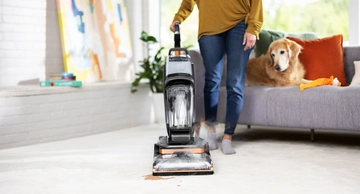Make Your Home a Healthier Place to Live for Your Family in Ten Ways
Making the family home healthier and safer for all, especially your kids, is remarkably easy and actually won’t require much of a budget depending on the scale of the projects you have in mind.
The number of accidents that occur in UK homes is worrisome and isn’t limited to accidents involving children, in fact, if you have aging parents or neighbours, many of the tips you’ll find here are just as applicable to their homes as they are yours, so help them address some of the points made here – testing smoke detectors and paint, setting the hot water heater, etc. – in order to make your family’s home, and theirs, a safer place for each and every one of you.

1. Address the dust issue
Dust in the family home is not only a prominent aggravator of asthma and allergies; it also often contains an alarming number of poisons and toxins which can harm the health of your family.
Vacuum regularly and change the filter bag each time. Moreover, if you can afford it, the best way to address the dust issue is to replace your carpets with cork, wood, tile or vinyl flooring.
2. Filter your tap water
A water filter is an affordable investment and you and your family will immediately notice a significant improvement in the taste of your drinking water. This could prove the impetus required for your children to drink more water.
Research shows that tap water often contains an alarming number of contaminants, so filter your tap water and change the filters regularly.
3. Avoid the use of antibacterial soap
Antibacterial soap might seem like the best choice but research shows that it can actually weaken the human immune system leaving your family more vulnerable to illness. What’s more, triclosan, the main ingredient in antibacterial soap, may interfere with the human nervous system and sex hormones.
4. Test your paint
If you’ve had your home painted recently with quality paint this won’t be a problem but old paint often contains lead and other chemicals which can have a nasty effect on the human body.
Paint testing is actually very affordable and most certainly worth the small cost involved. Contact your local council or health department because many will test your paint for a smaller fee than a private company.
5. Relegate smoking outdoors
We all know just how damaging to the human body smoking is – there are over 4,000 chemicals in tobacco smoke. If you’re not interested in quitting, at least do your family the favour of smoking outside.
6. Use organic cleaning products
Many commercial cleaning products are harmful to the human body and you’ve probably noticed the adverse effect on your lungs when cleaning the bathroom with products that contain harmful chemicals like ammonia and chlorine.
There are many ‘green’ products on the market that work just as well without the harmful chemicals found in many commercial cleaning products. Vinegar and hydrogen peroxide are two excellent substitutes and there are many more.
7. Watch cans, plastics and Teflon
Canned foods are more affordable and often something we can’t do without, but they often contain biphenyl A and other contaminants so make a concerted effort to reduce the amount of canned food you buy.
Many plastics, including baby milk bottles, also contain contaminants and should therefore be avoided. Teflon is something else to watch, so treat your Teflon pots and pans well to avoid scratching them because scratches can put your family’s health at risk due to the chemicals used in non-stick cooking surfaces.
8. Set your hot water heater
Accidents involving hot water are among the most common and the most serious for young children and aging adults. However, they’re also remarkably easy to prevent by setting your hot water heater at 120 degrees F, which is 20 degrees F lower than what would amount to a ‘scalding temperature’.
9. Don’t use insecticides and pesticides
Insecticides and pesticides aren’t only dangerous to insects and pests in the family home; they’re also harmful to human health as well.
However, sometimes insect and pest infestations need to be addressed and if that’s the case, contact a provider of pest control services in Sydney and consider preventative measures, like storing your food in airtight containers and washing your dishes and plates more thoroughly.
10. Check your smoke detectors
Smoke detectors can save your family’s life but they aren’t much good if they’re not working. Check your smoke detectors regularly by testing the batteries and also by performing a smoke test with matches. This is by far the best way of ascertaining whether they’re working as they should.
A healthy, hazard-free family home is something that each and every one of us can enjoy. Take note of these handy tips to make your home a safer place.


